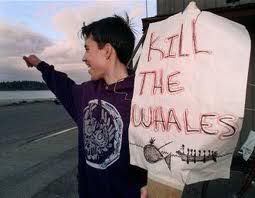
[ON MY WAR PATH - 014 - Anti-Makah-Whaling]
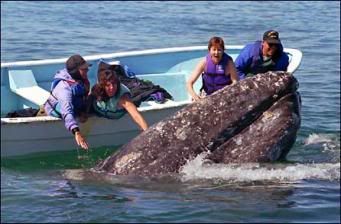
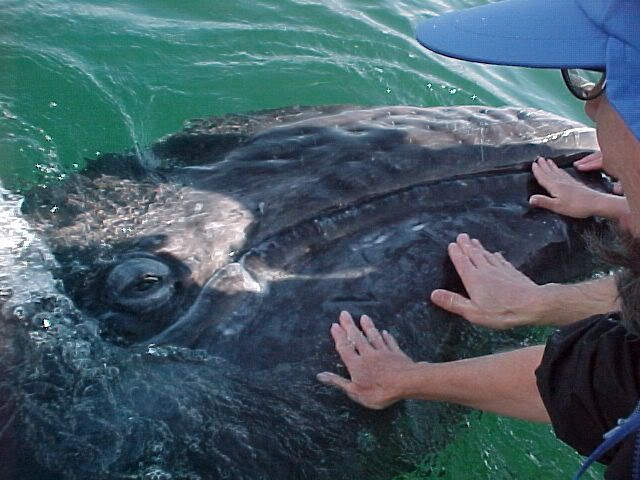
The Makah whale hunt was a betrayal of trust
In 1999, other than going to India for the third time, and conducting more educational outreach in North America, and going to New York to conduct more Chinatown media events, and founding my own organization Heal Our Planet Earth (HOPE - www.HOPE-CARE.org), I also worked with a loose alliance of anti-whaling activists in Washington state, British Columbia and Oregon to oppose the proposed revival, by the Makah natives of Washington state,
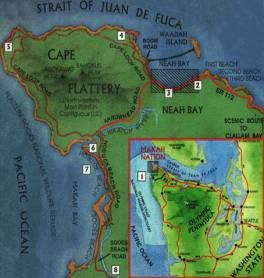
of their whaling tradition which had been halted for 70 years.
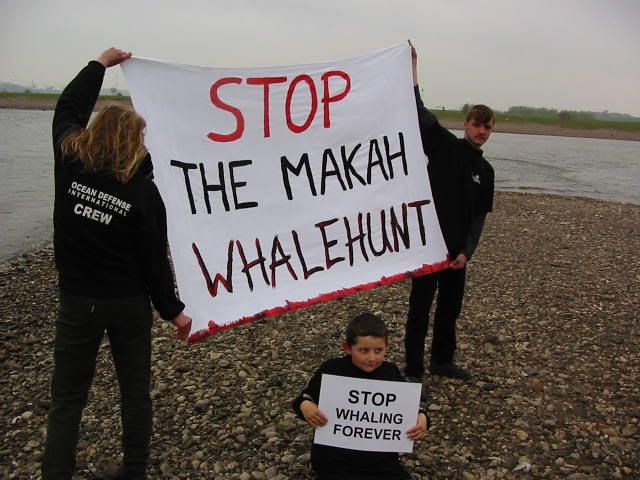
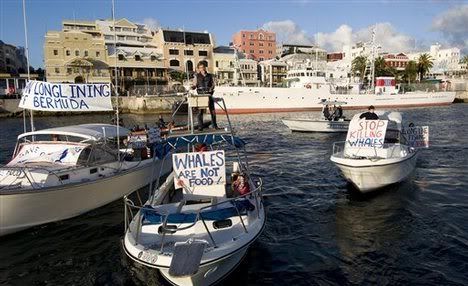
There was a government imposed exclusion zone barring entry of protest vessels from the kill zone of their "traditional hunt", which involved a .50-calibre rifle and a power boat, other than their canoe and their ceremonial harpoons, "ceremonial", that is, to the Makah, not to the whale.
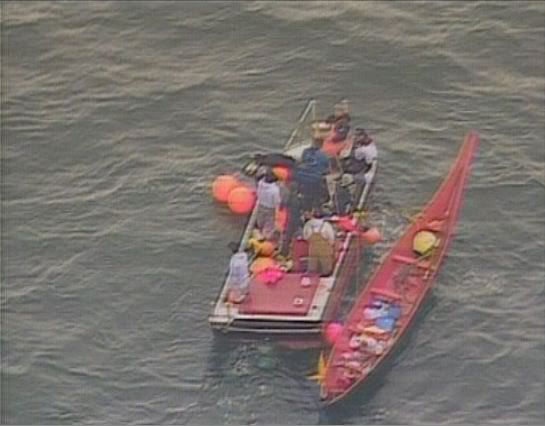
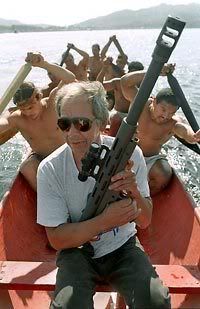
I have personally entered the Makah village at Neah Bay, WA, and was mistaken by a Makah to be a member of one of the Nuu Cha Nulth bands on Vancouver Island, from whom I received some sensitive information which I later shared with the anti-whaling alliance.
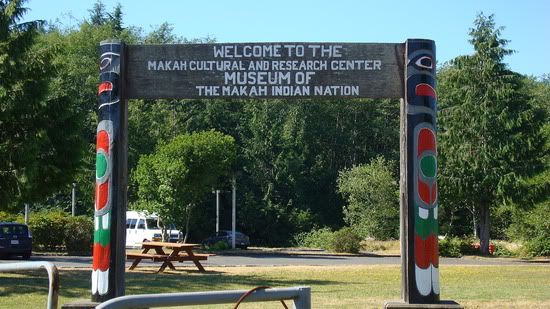
My main contribution in this campaign was mostly in my writing and statements to media in news releases and when asked. The following newspaper articles and video will tell the story of what led up to, and transpired on, May 17, 1999 - a day of infamy - any why.
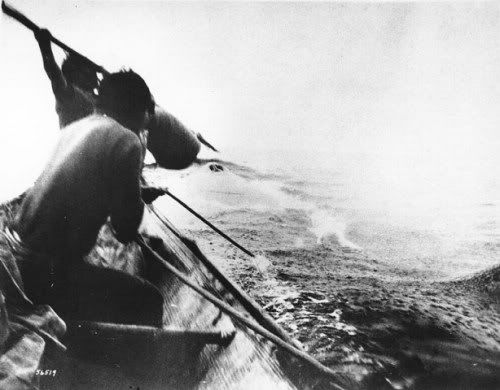
Anti-Whaling
The tradition is welfare
October 5, 1998
Alberta Report
Despite a plentiful supply, Greens vow to stop an Indian whale hunt
If nothing else, animal rightists cannot be accused of prejudice: they favour beasts over men, whether the latter are black, white or red. Indians rank high in the pantheon of political correctness, but not as high as whales. So Washington State Indians intending to kill the massive mammals for food were at a disadvantage, even before it was revealed that their "traditional" hunting method depends on a distinctly modern weapon—the machinegun.
The controversy is especially upsetting to Tom Happynook of Victoria, chairman of the World Council of Whalers, who says similar hunts are being planned in British Columbia. "We're up against urban people who don't even know milk comes from a cow," he charges. "What right do they have telling us what to do? Natives in coastal communities are eating corned beef hash out of cans and Kraft Dinner. We just don't have any money."
The culture clash erupted in August, when the 1,400-strong Makah tribe of Neah Bay on the Olympic Peninsula announced they will hunt up to five grey whales each year starting October 1 under an agreement authorized by the International Whaling Commission and the U.S. Commerce Department.
The grey whale suffered near-extinction in the 1920s, but today is no longer on the U.S. endangered species list; more than 20,000 swim up and down the West Coast twice yearly.
Keith Johnson, president of the Makah Whaling Commission, said that resuming his tribe's historic October hunt "is a link to the past and it validates us, who we are as a people and a culture." He added that the hunt will bring badly needed food to the dinner tables of his people, who along with non-natives have suffered job losses in local logging and fishing industries because of environmental sanctions.
No sooner was the announcement made than Project Sea Wolf, an anti-whaling offshoot of California's Sea Shepherd Society, staged a protest meeting in Victoria on August 29. Eco-pirate Paul Watson, the society's founder, was scheduled to speak but was replaced at the last minute by understudy Michael Kundu of Seattle. He told 70 sympathizers that the Makah does not require freezers full of whale meat and should go to Seattle if they want "amenities." "They get government subsidies," he argued. "They don't need this to survive."
Mr. Kundu then played a video of a protracted whale killing. He insisted that if the hunt is allowed to proceed, it would set a precedent and encourage more whaling around the world. He revealed his group intends to prevent the hunt by positioning a dozen boats, including a 32-foot submarine owned by Mr. Watson, off Neah Bay. The vessels will broadcast killer whale sounds to scare the grey whales into altering their migration route. "All we need is for them to swim a mile offshore," said Mr. Kundu, adding that the Makah's 18-foot dugout canoes will not be able to survive the rough waters farther from the shore.
Mr. Kundu also said that his band of eco-warriors will, if necessary, throw themselves between the harpoon-armed natives and the cetaceans. Given the current climate of tension between natives and non-natives over treaty claims, Mr. Kundu's remarks strike Mr. Happynook as ill advised. "He is deliberately and needlessly trying to cause bad feelings," he declares. "The reality is that people can still go whale-watching, do research, whatever, but somewhere in this equation the whalers are going to fit in."
The dispute escalated September 13 when an ad-hoc group called the Westcoast Anti-Whaling Society—consisting of a fishing boat, several whale-tour operators and other boaters—congregated in Victoria's Inner Harbour with placards reading "Wounded Whales Feel Pain." Leading the protest was Western Canada Wilderness Committee campaigner Anthony Marr, who in the past has lobbied to end bear and tiger hunting.
Mr. Marr accused the Makah of being inhumane, claiming the whales die a lingering death after being first secured by a hand-thrown ceremonial harpoon and then riddled with bullets. "Five hundred rounds might be pumped into a whale. It can take a whale 30 minutes to two hours to die," he said. Not so, says Makah member Jimmy Thompson.
"What we intend on doing is using the machinegun to sever the whale's spinal cord, which will kill it instantly—unlike in the past when a whale could tow our canoes around for days on end," he explains.
Mr. Thompson echoes the sentiments of other Indian hunters by remarking, "People like Marr are not interested in us evolving, they're just trying to assimilate us. That's been tried before, and we won't allow it."
Last week, spectators were allowed onboard Mr. Watson's ship Sea Shepherd, which was docked in Seattle, to view his two-man sub, which is painted to resemble a killer whale. Meanwhile, Washington State Republican Congressman Jack Metcalf and animal activists from the U.S., Britain and Australia have filed a lawsuit to prevent the hunt; they claim the federal agencies which reviewed the Makah case erred when they declared it environmentally safe. They are requesting Federal Judge Franklin Burgess to send the case to the National Marine Fisheries Service for a full environmental review. He will make his decision this week.
-- Robin Brunet
---------------------------------------
Note by Anthony Marr: The Russian Chukotka people, who also hunted (hunt?) the Grey whale used (use?) the AK47 assault rifle, and were known to have pumped over 500 rounds into a single whale, which still lingered for a long dying-time. The Makah used a .50-calibre rifle, and still needed multiple rounds. And under the conditions (see the video below), for the shooter to claim any accuracy is a lie and a joke.
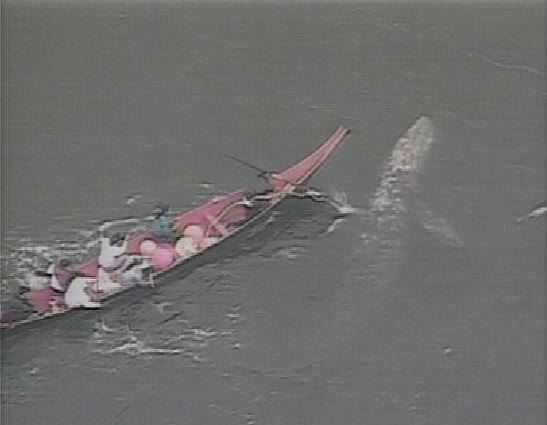
Anti-Whaling
WHALE RIGHTS COME FIRST
An environmentalist argues that no one, neither Norwegian nor Makah, has the right to kill any of this intelligent species, whether it be for commercial or ceremonial reasons
The Vancouver Sun
Date: Fri 09 Oct 1998
Edition: Final
Section/Category: Editorial
by Anthony Marr
I respect aboriginal rights, but I respect even more the right of the whales to live, and live in peace and harmony with humans.
Grey whales annually migrating up and down the North American coast, as well as those that live in our waters, have been living in peace and harmony with humans for more than 70 years.
They've come to enjoy human company and allow us the privilege of touching them. Whales and dolphins have been documented as saving drowning humans.
I have no doubt that whales are not only sentient but intelligent. Even small cetaceans like dolphins have brains larger and more convoluted than our own. They have sophisticated social and behaviour patterns, complex languages and even distinct dialects. The songs of the humpback change from year to year.
The Japanese and Norwegians are strong backers of the Makah's ``right'' to kill whales. They have given at least $10,000 US for the Makah's whaling campaign.
These pirate whaling nations are not acting out of interest in the Makah as a people or respect for aboriginal rights. They are using them as a can opener to restart whaling for ``cultural need.'' Once the Makah succeed in taking their first whale, the Japanese and Norwegians can then claim the right to whale for ``cultural needs'' of their own.
Tom Happynook, a Makah relative and figurehead of the World Council of Whalers, says the Japanese are justified in continuing to kill whales and dolphins for so-called "scientific" reasons in the face of a global whaling ban. Maybe he can tell me how much science is involved in consuming a plate of whale sushi.
Perhaps the Makah whalers are not aware that they are being used as pawns in a high-stakes global game, or perhaps they don't care. They claim no commercial interest, but before engaging their current public relations team, they said that each grey whale would bring them in excess of half a million dollars US.
The Makah whalers-to-be also say, "It's not a hunt, but a gift from the ocean."
I would accept this if it refers to a group of whales that beached themselves in spite of human efforts to return them to the sea. But for people to go out and kill them by a means more cruel than the explosive-tipped harpoon is sheer pillage and murder.
The proposed "traditional hunt" involves the use of a steel-headed harpoon first-- to satisfy the "ceremonial" clause within permit parameters -- then a .50-calibre, anti-tank gun to finish the job.
In the Makah Manifesto published in a Seattle newspaper, the whalers assert that death will be instantaneous. But the Russian Chukotka native band, using similar methods and weapons, has been known to fire more than 500 rounds into whales that still take up to two hours to die.
This brings forth the issue of what Canadian authorities would and should do if a wounded whale enters Canadian waters. The policy is to allow hunters to pursue wounded whales to finish them off, which is tantamount to welcoming an assailant to enter your house to finish off a wounded friend who came for protection.
The whalers charge anti-whalers of being racists whose agenda is to put their cultural tradition into a museum. The opposite is true. Living traditions evolve with the times. It is they who are sticking with the treaty of 1855, signed when whales were thought to be fish, and before Charles Darwin's Origin of Species was published.
Although it was as late as the 1950s that orcas were still shot on sight, we have evolved since then. Today, we would be appalled if orcas were fired upon. Why then should grey whale shooting be condoned?
As a Chinese-Canadian, tradition to me is not sacred. It often stands in the way of human intellectual and spiritual evolution. As the campaign director of the BET'R campaign, the first thing I did was to challenge the Chinese tradition of using bear gall bladders and tiger bone for medicine.
I urge everyone to examine their traditions and shed those elements that are no longer consistent with today's environmental and humane principles. I ask those within the aboriginal communities to follow the lead of the Makah's Alberta Thompson and voluntarily forego the whale-killing as a treaty right.
Finally, I must make one thing clear. I am against killing whales, period. Even one whale killed is one too many, for any reason, by anyone, be they Japanese, Norwegian, Russian, or Makah.
by Anthony Marr
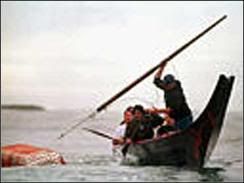
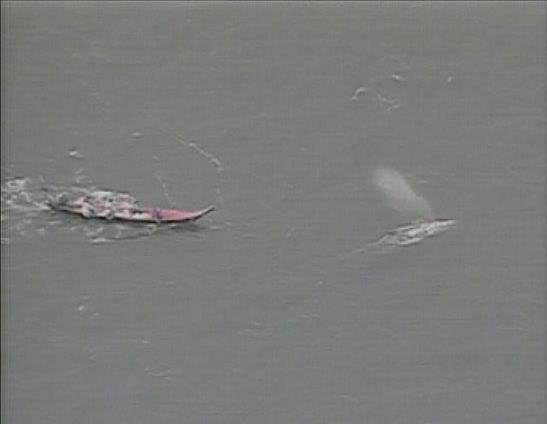
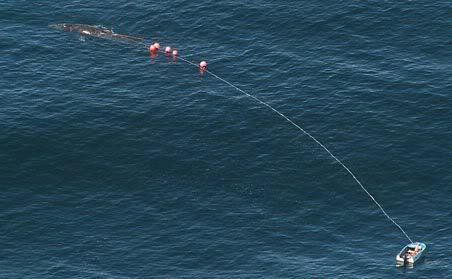
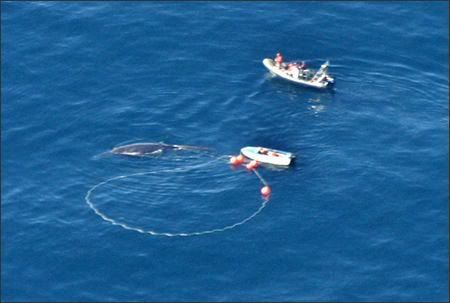

Anti-Whaling
PREMIER VOWS TO IMPEDE WHALE HUNTING IN BC
1999-05-18
The Vancouver Sun
by Craig McInnes and Doug Ward
[S.I.S.I.S. note: The following mainstream news article may contain biased or distorted information and may be missing pertinent facts and/or context. It is provided for reference only.]
VICTORIA -- B.C. will not sign any treaty with native Indian bands that includes the right to hunt whales, Premier Glen Clark declared Monday after the Makah tribe of Washington state made their first kill. Clark said whaling falls under federal jurisdiction, but it would be "outrageous" if a band were to be allowed to kill a whale.
The Makah killed a grey whale Monday morning, first harpooning it, causing the mammal to dive, then firing at least two shots into it at close range from .50-calibre rifles when it resurfaced several minutes later.
Two B.C. coastal native groups have claimed a hereditary right to hunt whales.
"We will use whatever leverage we have at the bargaining table and the treaties to ensure that there is no whale hunt in British Columbia." Clark said he was repulsed by the killing of the whale Monday, a reaction he believes most people will share.
But Aboriginal Affairs Minister Gordon Wilson was less certain that B.C. natives could be prevented from whaling. "It may well be that the rights that they have under Sparrow with respect to salmon may have similar application to harvesting of whales. That's something we have to look at," Wilson said. The Supreme Court of Canada ruled in 1984 that Reginald Sparrow, a member of the Musqueam band, had an aboriginal right to fish for salmon that superceded the right of the federal government to regulate the fishery.
Wilson said the current position is to refuse to approve any treaty that includes whaling, but if natives go to court to establish a right to hunt whales, that could change. "One obviously has to respect the law, but it's purely hypothetical at this point." He stressed that no band claiming a hereditary right to hunt whales has yet brought the issue to the treaty table. "Our view is that they don't, they're going to have to prove that they do and if they choose to pursue it, I guess they'll have to do so in the courts," Wilson said.
Liberal leader Gordon Campbell called the whale kill "an appalling, senseless, wasteful, disgraceful act."
"I certainly don't want it happening in British Columbia for any purpose, whether it's commercial or ceremonial or customary." Campbell said he had legal advice that natives do not have an aboriginal right to hunt whales. "I think it's a brutal and archaic practice. I think that it should be stopped."
Clark's remarks were criticized by Nelson Keitlah, co-chair of the Nu-Chah-Nulth Tribal Council, which represents 13 bands on the central and north coast of western Vancouver Island and wants to negotiate whaling rights in its treaties. "Colonialism hasn't really left us, has it?" said Keitlah. "He [Clark] is saying what we should eat and what we shouldn't eat."
Keitlah also said that it was improper for the premier to determine which issues will be on the bargaining table in the Nu-Chah-Nulth treaty talks.
"We are in treaty negotiations and that is one of the issues that will be there. It's not on the table. But upon our insistence it will be."
Keitlah said that whaling is important to his people for food but also for cultural reasons. "It's part of reaching for that epic where capturing a whale is the ultimate for any of our hunters." Keitlah said that members of his band are proud of the whale killing carried out by the Makah. "This is a historic day for our people. We want to send our congratulations to the Makah nation. It's been 70-80 years since it was last done."
Keitlah, who is based in Port Alberni, said it was whaling by white men that seriously reduced whale stocks -- not whaling by native people.
"We had nothing to do with their [the whales'] demise. But all of a sudden people are upset when we want to take one."
The Ditidaht and Pacheedaht bands, located about 120 kilometres northwest of Victoria, also have significant cultural ties to whaling.
Anthony Marr of the Western Canadian Wilderness Committee, said the anti-whaling campaign is not aimed at aboriginal rights. "We are not pointing fingers at the native people. We are just against whaling." Marr said it was "ludicrous" to describe Monday's whale killing as a revival of tradition. "How traditional is a power boat, or a .50-calibre gun?"
Marr said that the Makah's whale hunt has little to do with the band's food needs. "It's something they've chosen as a vehicle to assert themselves as a self-determined people.
"If they want to do that -- all power to them. But if they do it at the expense of a whale, they should first of all consider the self-determination of the whales."
The whale kill was also attacked by animal-rights activist Peter Hamilton of the Vancouver-based Lifeforce. "Anyone who enjoys subjecting an intelligent, sentient whale to an agonizing, slow death is a bloodthirsty savage," said Hamilton. "I don't know how these whale murderers can live with themselves."
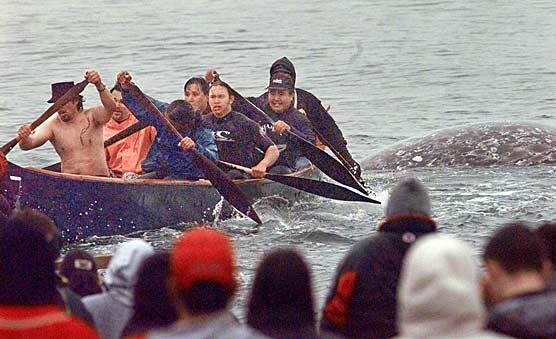
They shot the whale multiple times with a .50-calibre military rifle, towed the whale back by power boat, then switched back to the canoe in the last couple of hundred yards - amazing demonstration of their great "tradition". They couldn't even bother to tough it out by canoe as their ancestors did. I called them "lazy"; they called me "racist".
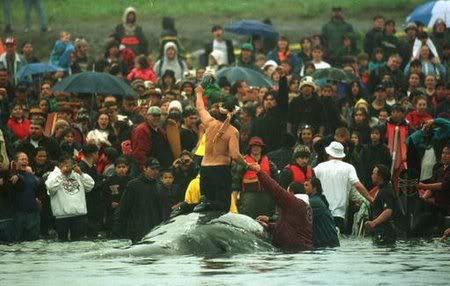
A hero's welcome to a bunch of cowards
Anti-Whaling
Open letter to the President and Vice President of the United States of America
2000-03-07
Dear President of the United States of America:
On February 11, 1997, you wrote a letter to the U.S. Congress citing Canada as having "conducted whaling activities that diminish the effectiveness of a conservation program of the International Whaling Commission", regarding the granting of whaling licences to the Canadian Inuits without IWC approval. We as Canadians take your point well, and pledge to pursue the matter with our government. This letter, however, concerns the killing of a Grey whale by your own Makah tribe.
In the same letter to Congress, you also wrote: "I understand the importance of maintaining traditional native cultures, and I support aboriginal whaling that is managed through the IWC." On this, we beg to differ, and hope that you will reevaluate the basic philosophy behind this statement.
First, we question the word "traditional". Obviously this is a key word distinguishing aboriginal whaling from non-aboriginal whaling, and must itself therefore be clearly defined. In particular, should traditional whaling employ definitely non-traditional equipment such as motorized watercraft and armour piercing firearms? We believe that the vast majority of Americans and Canadians would say a resounding "NO!"
More basically, and especially applicable to the Makah, is the question of traditional need, namely food, clothing and fuel. The Makah have done without whale-derived food, clothing and fuel for over seven decades. High on their list of reasons is to use the killing of whales to solve their people's alcohol and drug abuse problems. Kindly show us the traditionality of this reason.
Even more basic than this is whether all elements of traditional aboriginal culture are to be held sacrosanct. If so, then even slavery should be revived. If not, then why should killing whales be so unquestionably honoured?
Ultimately, we believe that as civilization advances on to a new millennium, killing sentient, intelligent, peaceful and trusting creatures like whales and dolphins can no longer be justified, for any reason, by anyone, be they Japanese, Norwegian, Russian, American (Makah), or, yes, Canadian (Inuit). This means that within or beyond IWC parameters, whaling must end.
We ask you to please re-examine the basis of your thinking, which the vast majority of your citizens, judging by their overwhelming opposition to the hunt, obviously have done.
Yours sincerely,
Anthony Marr
Anti-Whaling
International approval lacking for whale hunt now under way
2000-04-25
Times Colonist (Victoria) Tue 25 Apr 2000
by Anthony Marr
Contrary to popular belief, the Makah do not have the approval of the International Whaling Commission to hunt grey whales, and therefore their whale hunt is illegal.
In 1998, Dr. Ray Gambell, secretary of the International Whaling Commission, said, "The IWC has specifically not passed a judgment on recognizing or otherwise the claim by the Makah Tribe, since the member nations were clearly unable to agree."
The Australian delegation said, "The Australian delegation made it clear that it accepted the Chukotka Natives' request and claim that they clearly met the requirements ... whereas the request and claim of the Makah people did not. This view was endorsed explicitly by a clear majority of the delegations. After a lapse of some 71 years of whale hunting by the Makah ... the requirements of the amendment are not met, nor have they been met on cultural grounds."
And on the United States' claim that the commission has adopted a quota that allows a five year aboriginal subsistence hunt by the Makah, "The Australian delegation explicitly rejects these claims as false and giving an entirely erroneous interpretation."
To qualify for subsistence whaling, continuance is a crucial
factor, which Makah whaling clearly does not have. The IWC has not changed its position.
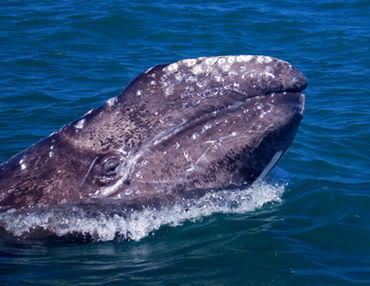
Please spare me.
Anthony Marr, Founder and President
Heal Our Planet Earth (HOPE)
Global Anti-Hunting Coalition (GAHC)
Anthony-Marr@HOPE-CARE.org
www.HOPE-CARE.org
www.facebook.com/Anthony.Marr.001
www.facebook.com/Global_Anti-Hunting_Coalition
www.myspace.com/AnthonyMarr
www.youtube.com/AnthonyMarr
www.HomoSapiensSaveYourEarth.blogspot.com
www.DearHomoSapiens.blogspot.com (AM's 3rd-book-in-the-making)
www.myspace.com/Anti-Hunting_Coalition
www.ARConference.org
No comments:
Post a Comment